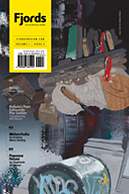April 09, 2021
The Ghost Parade
by Elizabeth Parson
As the tourists order their first round of nightcaps, Spaniards just are beginning their suppers, and the restaurants swarm. Lights glimmer from the shops, their walls lined with black and white images of round shrouded women and brooding bulls long dead and slaughtered. Waiters sway beneath platters of
She catches my eye first, this thin, grandmotherly woman, scarf wrapped about her hair like the gypsies do. But she is too still and scrubbed to be a gypsy. I smile and continue scanning the people that pass, looking for boys, jewelry, a place to stop and enjoy a cold reprieve. She doesn't let go of my gaze, though; she wants to tell me something.
The grandmother approaches and stands before me, her tiny head just reaching my chest. She eyes me politely. The exuberant procession parts and flows around us as if we are stones in a river.
“English?” she asks.
“No, we're American,” I reply, swaying with the crowd as it pushes against us.
“You speak English, though,” she responds, and now her British accent is apparent. I imagine her baking cookies in some quiet corner of Canterbury, her frail fingers smoothing a daisy-printed apron.
“Yes,” I smile. “We speak English,” I say, and now her brow drops from an expectant gaze to one of relief.
“Oh thank goodness,” she sighs. “American then. It's been ages since I heard English.”
I swell a bit at the thought of rescuing this quaint lady, whose name I imagine is Tilda. Did her children abandon her for a night of tapas and drinking? Had she forgotten which direction the hotel was in? Shall I walk her over to the Tourist Police and see that everything is straightened out?
“Is there something we can help you with?” I ask, though suddenly I realize that “we” are no longer. My father and brother have moved further up the street. They stand huddled together, their gazes directed towards our interaction with uncertainty.
I smile and wink an eye at them, and turn to face Tilda again. But as she opens her lips to return the smile, her features deepen in the streetlight. Her rouge is too heavy, as if scrubbed on by steel bristles, and her front teeth are missing, square, gaping spaces in their stead. The edges of those that remain are too precise, unsettlingly angular. She is suddenly not a grandmother, and my heart slams against my ribs.
“I've been looking so long for someone who speaks English,” Tilda moans, drawing out the words in thick, heavy breaths. She smells so ancient, so familiar, that I take a step back without realizing.
“Perhaps we can go to the theater together,” she says.
“But don't you have somewhere to go?” I ask. “Aren’t you traveling with people?”
I want to keep walking suddenly, to join the flow of passersby once again. The crowd has thickened up the road, and my father and brother have been swallowed within it.
Her face falls ever so slightly, almost imperceptibility, like a breeze changing direction on a busy street. “I lost them in the Strait of Gibraltar,” she replies slowly, eyes widening.
I notice her gums are tattered slightly then, rimmed with blood. In my mind, three mousy-haired, blue-eyed travelers sink beneath the swollen sea like rubble from a shipwreck, and their eyes are the same, if younger. Wild, confused, frantic. Clawing at the foam as it swallows their heads, searching for a lifeline.
I imagine Tilda standing on the bank, unmoving, her sagging cheeks damp with grief.
"I... we...” I stammer, patting my hip to check for my wallet, “I really hope you find them.” I nod in a way I hope she finds reassuring. I make my departure and join the flow of the crowd.
As I begin to back away, I smile at her with as much sympathy as I can fein, hoping she does not sense my terror. It’s all right, grandmother. They’ll come for you some day. I’m sure of it.
Tilda's face has fallen but she offers me her best bloody grin. She understands. She's been abandoned before, maybe many times. I watch her as she fades back into the clamor, just one more strange face among the strange scenery. The shadows bear down on her fragile frame; at last she becomes part of them, indistinguishable.
But I can’t forget her face. She had a message, I’m sure of it, because I can’t forget her face. She had a message for me and I shut her down, pushed her away, sealed myself up tight.
I returned to Seville twice to search for her in the streets, hoping for a second chance. I wanted tell her that I am not cruel. I wanted to tell her that she is not a ghost.

